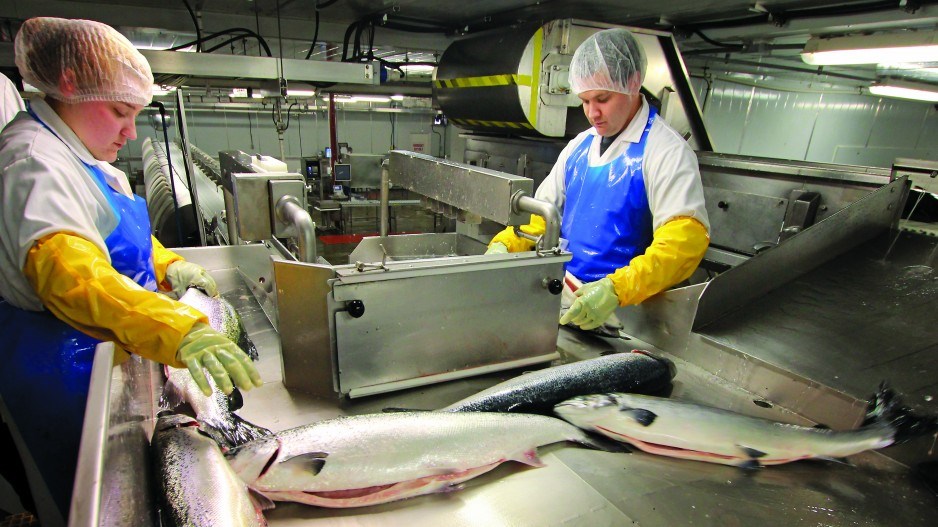Atlantic salmon from B.C. salmon farms is a good alternative, a new study by the Monterey Bay Aquarium’s Seafood Watch program concludes.
Based on a review of a number of scientific studies and data from the industry, Seafood Watch has yellow-lighted B.C. farmed salmon.
Until now, B.C. farmed salmon had a “red” light rating, which meant it should be avoided. A yellow light ranking means that, while there are still concerns over sustainability and environmental issues, it is recommend as a good alternative to wild species that may under threat or other farmed species that may not be cultivated in a sustainable way.
The rating is good for the B.C. salmon farming industry, said Jeremy Dunn, executive director for the BC Salmon Farmers Association, since about 50,000 metric tonnes of the 76,000 tonnes produced annually in B.C. is exported to the U.S. and many American restaurants use the Seafood Watch program as a guide to sustainable seafood.
"B.C.'s the only region that, regardless of company, they've said the fish would meet this standard," Dunn said.
The David Suzuki Foundation, which developed its own SeaChoice certification program in collaboration with what it called the “acclaimed” Seafood Watch program, is calling the latest report from Seafood Watch “problematic.”
“The problem is that yellow-ranked seafood is widely viewed as a sustainable choice when often significant environmental concerns remain,” Kelly Roebuck, SeaChoice representative from Living Oceans Society, said in a press release.
“Salmon farmed in open-net pens won’t be a sustainable option until operations change, transparency improves and broad scientific consensus concludes that wild salmon populations aren’t negatively affected.”
"We see this as a signal we're on the right path," Dunn said. "It's unfortunate that organizations that are critical, that are pushing the industry, and have been pushing the industry to improve for years, seem to have a challenging time acknowledging these improvements.
"I believe they're fundamentally opposed to farming in the marine environment regardless of what the environmental performance or science says."
The Seafood Watch report found that the salmon farming industry in B.C. has made significant strides in reducing pesticide and antibiotic use, as well as reducing the ratio of fish and fish oil in salmon feed.
The biggest concern about salmon farming in B.C. is the potential transmission of disease to wild stocks.
But after reviewing “a growing body of research" – including the Strategic Salmon Health Initiative – the report concludes: “Although a level of concern is warranted, there is currently no evidence that there is any impact from salmon farms to wild salmon. Importantly, there is also no evidence that there is no impact.”
The report acknowledges concerns that sea lice from salmon farms may cause outbreaks and mortality among wild stocks, and notes that, while salmon farms managed to reduce sea lice outbreaks since 2003, there was an outbreak in 2015 that underscores that the industry “is still vulnerable to environmental variability.”
“Overall, there is clearly a pathogen and parasite concern with regard to the location of salmon farms along migration routes of wild salmon, and this concern is highlighted by the importance of wild salmon,” the report concludes.
“But after detailed consideration of the available data, they indicate that, although sea lice levels in particular are not fully under control and projected mortality in anomalous years can be substantial, there is currently insufficient evidence to conclude that population-level impacts to wild salmon are occurring due to pathogen and/or parasite transfer from salmon farms.”
“We disagree with the conclusion that disease and sea lice from B.C.’s farmed salmon have no population-level impact on wild salmon,” said Karen Wristen, SeaChoice steering committee member from Living Oceans Society. “We don’t see conclusive scientific evidence in the report to justify the ranking change. Peer-reviewed science indicates significant concerns remain in this respect.”




